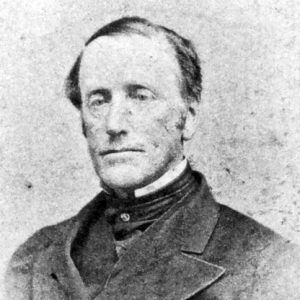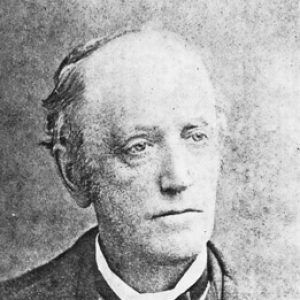calsfoundation@cals.org
Henry Merrell (1816–1883)
Henry Merrell of New York was both an industrialist and an evangelical who contributed to the development of Arkansas and Georgia. He has been credited with the beginning of the Industrial Revolution in Arkansas, and he also served the state as a Confederate major and as an effective Presbyterian elder.
Henry Merrell was born in Utica, New York, on December 8, 1816, to Andrew Merrell, an influential printer, and Harriet Camp Merrell; he had two brothers and two sisters. Merrell began working at the Oneida textile factory in Whitesboro, New York, when he was fourteen. He participated in the religious movement of “The Second Great Awakening” and attended the abolitionist Oneida Institute in Whitesboro. Concerning his 1856 arrival in Arkansas, he wrote in his autobiography, “I had found the missionary ground for a manufacturer.”
He decided in 1839 to leave New York and work in Roswell, Georgia, managing the Roswell Manufacturing Company, which was owned by the city’s founder, Roswell King. In 1841, Merrell married Elizabeth Pye Magill, the daughter of a wealthy Georgia planter family, whose brother, Charles Arthur Magill, later became Merrell’s business partner in Arkansas; they had no children. While in Roswell, Merrell also became close to the Smith family, whose son William would later work for Merrell in Pike County, Arkansas. The Smiths were Merrell’s friends and heirs, and his writings were later found in their historic Roswell home. In his autobiography, Merrell states that he “had a calling to fulfill” in Roswell and that he wished “to promote a system of Southern Manufactures, which I hoped would, in the course of time, reconcile Southern with Northern interests, and neutralize the effects of mad and ultra politicians on both sides.” In January 1845, he left the Roswell Manufacturing Company and became the builder and operator of the Curtright Manufacturing Company’s Long Shoals Factory on the Oconee River in Georgia. Merrell also began a steam-powered plant in Greensboro, Georgia, but its financial difficulties convinced him to move once more.
Using an 1847 map of the United States, and drawing data from the 1850 Census, Merrell decided that he wanted to move to Arkansas. He chose a site on the Little Missouri River in Pike County, three miles north of Murfreesboro (Pike County). When he first came to Arkansas in January 1856, traveling with his nephew William Smith, he met General Grandison D. Royston and so named the site that he had bought “Royston.” To power his new textile mill, Merrell began building a dam on the Little Missouri, which he completed after August 1856; constructed with local materials and labor, it held back ten to twelve feet of water and remains standing today. By January 1857, the Arkansas state legislature had chartered Merrell’s Arkansas Manufacturing Company.
Merrell sold the Royston mill in February 1863 and was soon commissioned a major in the Confederate army. Confederate general Theophilus Holmes sent him to build a blockade on the Arkansas River to protect Little Rock (Pulaski County) from an attack by Federal ships. After finishing that task in July 1863, Merrell moved to Camden (Ouachita County).
Edmund Kirby Smith, the commander of the Confederacy’s Trans-Mississippi Department, sought Merrell’s help in beginning a manufacturing establishment in Mound Prairie, Texas, and eventually sent Merrell to England to buy machinery for it. The war ended while Merrell was on duty in England. Before returning to the United States, he traveled in Europe.
During the remainder of his life in Camden, Merrell was a powerful elder in the Presbyterian Church. He was also a trustee of the Presbyterian-affiliated Arkansas College (present-day Lyon College) in Batesville (Independence County). In 1867, Merrell and Magill entered the mercantile business in Camden. By 1872, he seems to have contracted tuberculosis. He died in Camden on January 19, 1883, and is buried there in the Confederate Cemetery.
For additional information:
Merrell, Henry. The Autobiography of Henry Merrell: Industrial Missionary to the South. Edited by James L. Skinner III. Athens: University of Georgia Press, 1991.
Wilson, Harold. Confederate Industry: Manufacturers and Quartermasters in the Civil War. Jackson: University of Mississippi Press, 2002.
James Lister Skinner III
Presbyterian College, Clinton, South Carolina









Comments
No comments on this entry yet.